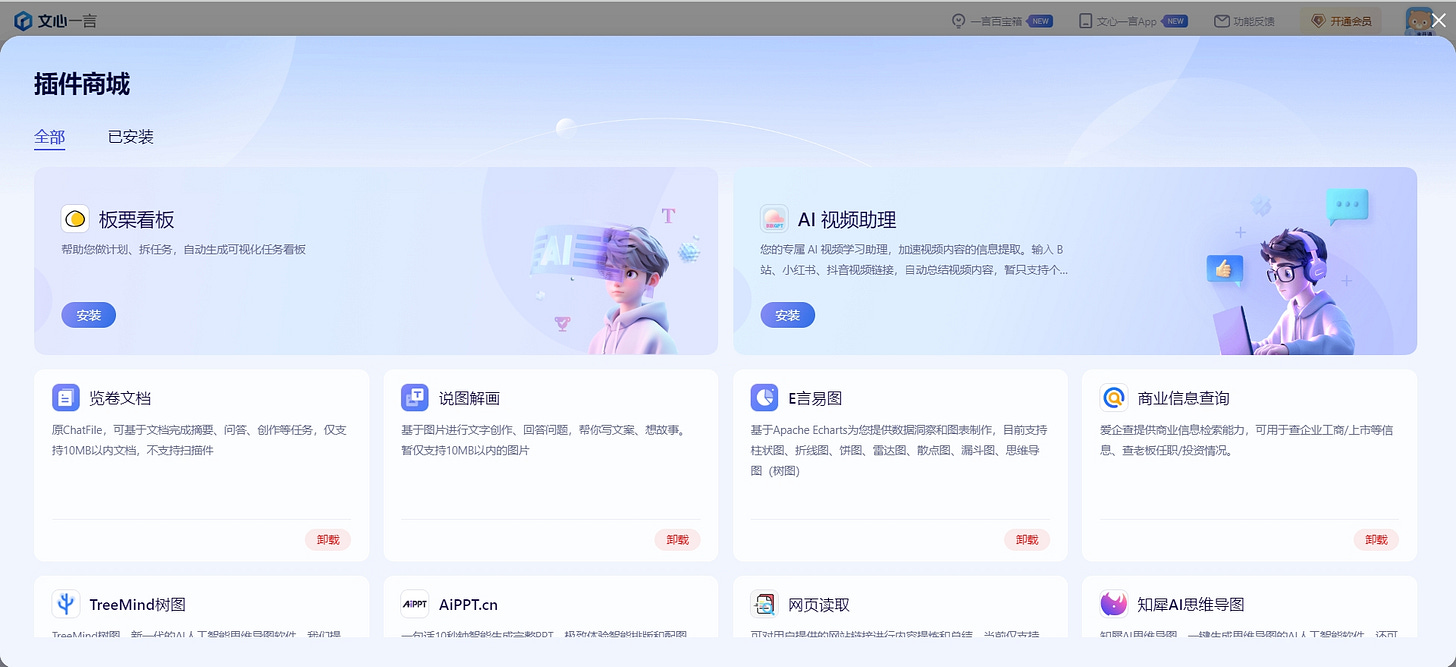😭SenseTime Founder & AI Visionary Tang Xiaoou Passes Away, Alibaba Doubles Down on AI E-Commerce, and ByteDance Uses OpenAI Tech to Train LLM
Weekly China AI News from December 11 to December 17
Hello readers, I wanted to take a moment to honor the memory of Tang Xiaoou, the founder of SenseTime, who sadly passed away last weekend. A luminary in the field of AI, Dr. Tang’s work in deep learning and computer vision has left an incredible mark on the industry.
I will also discuss Alibaba’s investments in AI-powered e-commerce, and why ByteDance reportedly uses OpenAI tech to train its LLM behind chatbot Doubao.
AI Pioneer and SenseTime Founder Tang Xiaoou Passes Away at 55
What’s New: Tang Xiaoou, a renowned AI scientist and the co-founder of SenseTime, passed away on December 15 Beijing Time, at the age of 55. His sudden passing is a significant loss to the AI community and a huge hit to the embattled company he co-founded.
Who’s Tang? Beyond his position at SenseTime, Tang was also a distinguished Professor in Information Engineering at the Chinese University of Hong Kong (CUHK), Director of the Shanghai AI Laboratory, and Director of Pujiang Lab.
Born in 1968, Tang graduated with a B.S. degree in computer science from the University of Science and Technology of China in 1990. He then earned his Master of Science from the University of Rochester in 1991 and a doctorate in computer vision from the Massachusetts Institute of Technology in 1996.
Tang joined CUHK in 1996 as an assistant professor and founded the Multimedia Laboratory at the university in 2001.
Tang worked at Microsoft Research Asia (MSRA) from 2005 to 2007 before co-founding SenseTime with Xu Li in 2014.
At the time of SenseTime’s IPO in December 2021, Tang’s net worth was estimated to be around $3.4 billion.
Tang also served as Associate Dean at the Chinese University of Hong Kong.
Why It Matters: Tang has been recognized as a forward-thinking scientist. His early work in applying deep learning to computer vision tasks laid the groundwork for many future advances. Under his leadership, the CUHK’s multimedia lab achieved breakthroughs in facial recognition accuracy with the GaussianFace and DeepID algorithms in 2014, which surpassed human recognition capability for the first time. Built on top of this technology, he co-founded SenseTime.
Throughout his career, Tang has been a mentor who helped shape the careers of many prominent AI researchers, like He Kaiming, the author behind the revolutionary ResNet, and Dahua Lin, known for creating OpenMMLab.
Although Tang Xiaoou was not actively involved in SenseTime’s daily operations, his passing could significantly impact the company, which has already seen a 60 percent decrease in value over the past year.
You can find SenseTime’s obituary here.
Alibaba Accelerates AI E-Commerce Initiatives
What’s New: Alibaba has established multiple AI teams over the past year to incorporate AI into the e-commerce sector, Chinese media LatePost reported.
How It Works: The Alibaba International Business Group, which includes major platforms like Lazada, AliExpress, Trendyol, and Daraz, has established its AI Business team and dedicated a third of its workforce to model training. This team concentrates on developing multilingual e-commerce models, dialogue models, downstream tasks, and image generation technologies. Their first product Aidge, announced in November, is an AI-driven suite of APIs to empower enterprises in marketing, customer services, multi-lingual translation, and more.
The Alibaba Taotian Group, the unit behind Tmall and Taobao, has developed its LLM Xingchen for internal applications like search, advertising, recommendation, and content generation. The Group has consolidated about 20 teams into four units, which cater to Alimama, general consumers, business enterprises, and industry applications.
Why It Matters: Alibaba has been an AI frontrunner this year, showcasing it chatbot Tongyi Qianwen and integrating AI into its seach engine Quark and enterprise collaboration platform DingTalk. Despite these advances, the Chinese tech giant has been relatively quiet about AI’s role in its core business, e-commerce.
Following Pinduoduo’s market value surpassing Alibaba, Alibaba Founder Jack Ma called for change internally and added that “the era of AI e-commerce has just begun.”
ByteDance Uses OpenAI Tech to Build Its LLM Behind Chatbot Doubao
What’s New: ByteDance has been using OpenAI’s technology for its own LLM, The Verge reported. In response, OpenAI has suspended ByteDance’s account, as it might violate OpenAI’s terms of service, which state that its model output can't be used “to develop any AI models that compete with our products and services”.
How It Works: The Verge reported that ByteDance’s Project Seed, a foundation LLM behind chatbot Doubao, relied on OpenAI’s API during various development stages, including training and evaluation. ByteDance employees, aware of the misuse, discussed “whitewashing” evidence through “data desensitization” on their internal platform, Lark. This led to frequent maxing out of their API access allowance.
OpenAI confirmed to The Verge that they have suspended ByteDance’s account while further investigating.
In response, a ByteDance spokesperson said the outputs generated by GPT were used for annotating models in the early development of Project Seed and were removed from ByteDance’s training data around the middle of this year. The company’s statement to Chinese media outlets is more detailed:
At the beginning of this year, when the technology team started the initial exploration of LLMs, some engineers applied the GPT API service to experimental projects with smaller models. This model was only for testing, with no plans for going live, and it was never used externally. After the company introduced standard check for using GPT APIs in April, this practice has been stopped.
As early as April this year, the ByteDance LLM tream had already put forward clear internal requirements that data generated by the GPT model should not be added to the LLM training dataset, and trained the engineering team to comply with the terms of service when using GPT.
In September, the company conducted another round of internal checks and took measures to further ensure that the use of the GPT API complied with regulatory requirements. For example, by batch sampling to check the similarity between the model training data and GPT, to prevent data annotators from using GPT privately.
In the next few days, we will conduct another comprehensive check to ensure strict compliance with the terms of use of related services.
Does It Matter? Using GPT outputs for training and evaluating models offers a quicker alternative to building a team of human labelers for fine-tuning and assessing model performance. Users on Reddit already discussed legal navigations to fine-tune LLMs using OpenAI’s outputs such as through ShareGPT where users share ChatGPT conversations. This approach is also common in China, where a few models I tested resemble GPT’s style. However, heavy fine-tuning with OpenAI’s outputs might not grant regulatory approval in mainland China.
Weekly News Roundup
🌐 ERNIE Bot has launched its plugin marketplace, offering a collection of plugins for office efficiency enhancement, multimodal content understanding and generation, and business information queries.
🔍 Zhipu AI has released AlignBench, the first evaluation benchmark to assess model alignment with human intent across multiple dimensions.
📈 According to the Ministry of Industry and Information Technology’s CCID Research Institute, China has seen a surge in AI companies this year, with 368 new additions. The adoption rate of generative AI in enterprises has reached 15%. The market size of generative AI is approximately 14.4 trillion yuan.
🌍 Alibaba’s DAMO Academy has introduced SeaLLM, a LLM specifically tailored for Southeast Asian languages, along with a fine-tuned chat assistant, SeaLLM chat.
📸 Miaoya Camera can now identity and remove obstructive hair and turn closed-eye photos into “open-eye” images.
🌟 On February 7, at the first AI PC Industry Innovation Forum, Lenovo Group and IDC jointly released the first “AI PC Industry (China) White Paper.” IDC predicts that by 2024, over 70% of terminal devices on the Chinese market will feature AI.
🚗 On December 10, Li Auto announced at its smart software launch event that OTA 5.0 will include Mind GPT capabilities. Mind GPT, a multi-modal cognitive large model fully developed by Li Auto, focuses on in-car scenarios and customizes over 1000 specialized capabilities across 111 domains. Currently, Mind GPT is still in the beta testing phase.
Trending Research
Researchers from ByteDance USA and University of California, San Diego, proposed MVDream, a multi-view diffusion model that can generate consistent images from text prompts, combine 2D generality and 3D consistency, and enhance 2D-lifting methods for stable 3D generation. Read the paper MVDream: Multi-view Diffusion for 3D Generation.
Researchers from Alibaba introduced DreaMoving, a diffusion-based framework that can generate high-quality, customized human videos, controlled by target identity and posture sequences, integrating motion control and identity preservation, adaptable to various stylized models. Read the paper DreaMoving: A Human Video Generation Framework
based on Diffusion Models.
Researchers from Alibaba proposed I2VGen-XL for video synthesis, which addresses challenges in semantic accuracy, clarity, and spatio-temporal continuity by using a two-stage process with hierarchical encoders and extensive text-video/image data. Read the paper I2VGen-XL: High-Quality Image-to-Video Synthesis via Cascaded Diffusion Models.





